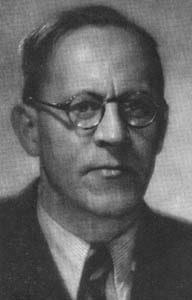b. 1895, Zurich – d. 1986, Warsaw
Biography

Kazimierz Sikorski was born on June 28, 1895 in Zurich. In 1919 he graduated from the Chopin Conservatory in Warsaw where he studied composition under Felicjan Szopski; in 1921 he graduated from Warsaw University (from the philosophy department). He also studied musicology under Adolf Chybiński in Lwów (now Lviv, Ukraine). In the years 1925-26 and 1930 Sikorski continued his music studies under Nadia Boulanger in Paris. For many years he taught composition and theory at the State Colleges of Music in Łódź, Poznań and Warsaw. He was the president of the State Colleges of Music in Łódź, (1947-54) and in Warsaw (1957-66). In the years 1953-59 he was president of the Polish Composers’ Union. Since 1968 he has been chairman of the Frederick Chopin Society.
Kazimierz Sikorski was a distinguished teacher of several generations of Polish composers and at the same time the author of numerous basic theoretical and pedagogical textbooks in the fields of harmony, counterpoint and study of instruments, among them “Study of Instruments”, “Harmony” in 3 volumes and “Counterpoint” in 3 vols. He won numerous awards, such as State Awards in 1937, 1951 (of the Second Degree, for music to the Polish film “Warsaw Premiere”) and 1955 (of the First Degree, for his composer’s activity and his great contribution in the field of teaching), Polish Composer’s Union Award in 1951 and 1975, Prizes at the Polish Music Festivals in 1951 and 1955, the Commander’s Cross ‘Polonia Restituta’ in 1955, an Order of the Banner of Labour of the First Class in 1960, and Music Award of the Capital of Warsaw in 1960. In 1975 he received the doctor’s “honoris causa” degree of the State Higher School of Music in Warsaw (now F. Chopin Academy of Music). He was granted honorary membership in the Polish Composer’s Union and in several music societies, such as the Frederic Chopin Society and Warsaw Music Society.
List of Works
Chamber Music
String Quartet No. 2 – 1918
Sextet for 2 violins, 2 violas – 1920
Orchestral works
Symphony No.2 – 1921
Overture for small orchestra – 1945
Suite ‘Rustic Pictures’ for small orchestra – 1945
- Wedding March
- A Maiden’s Complaint
- Dances
Symphonic Allegro – 1946
Suite from Istebna for small orchestra – 1948
Overture to the Pageant ‘Song of our People’ – 1949
Symphony No. 3 in the form of concerto grosso – 1953
Popular Overture – 1954
Symphony No. 4 – 1969
4 Polonaises of Versailles for string orchestra – 1974
Symphony No. 5 – 1974
The Canoni Su Un Tema Unico for string orchestra – 1981
Works for Solo and Orchestra
Concerto for clarinet and orchestra – 1947
Concerto for horn and small orchestra – 1948
Concerto for flute and orchestra – 1957
Concerto for trumpet and string orchestra – 1960
Polyphonic Concerto for bassoon – 1965
Concerto for oboe and orchestra – 1967
Concerto for trombone and orchestra – 1973
Vocal Music – Works for Soli, Choir and Orchestra
Stabat Mater Oratorio after the Mediaeval Hymns by Jacopone da Todi – 1943
Vocal Music – Works for Unaccompanied Mixed Choir
A Boy Told Me – folk tune
Bye-Bye – folk song
Cranberry Tree – Kurpian folk tune
Dark Night – Kurpian folk tune
Fly, Voice – Kurpian folk tune
In The Garden – Kurpian folk tune
In The Midst of the Field – Kurpian folk tune – 1947
Janek, Janek – Kurpian folk tune
Kurpian Mazurka – folk tune – 1947
Kurpian Waltz – folk tune
Listen Mother – Kurpian folk tune
Neigh Horse – Kurpian folk tune
Oh, Don’t Be Often with Me – folk tune from Sienna
On the Pasture – folk song
Take a Cart – folk tune
The Swans Veered – recruits’ folk song from the time of slavery – 1947
Three Silesian Songs
- The Willow
- How Am I Not To Be Sad
- A Maiden Drove The Cattle
When I Was Going – Kurpian folk tune
You Will Go Away – folk tune from the Kujawy region
Vocal Music – Work for Voice and Piano
Mazurka to the folk fest
Mother O’Mine to the folk text, for unaccompanied mixed choir – 1933
Manuscripts at USC
None
Page updated on